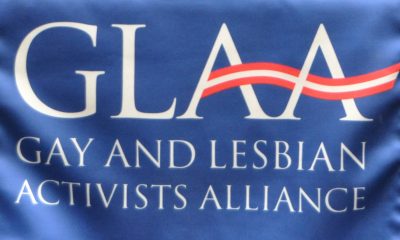Obituary
Law professor, LGBT rights advocate Joe Tom Easley dies at 81
Played key role in effort to repeal ‘Don’t Ask, Don’t Tell’
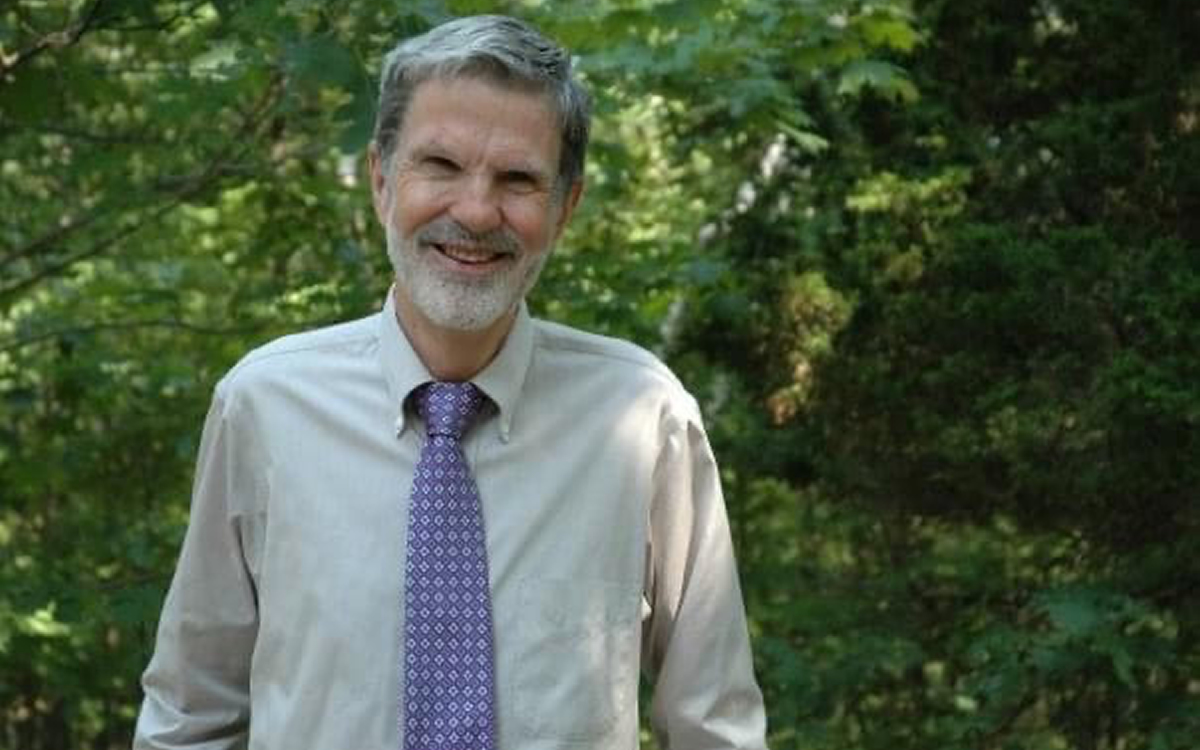
Joe Tom Easley, a nationally recognized attorney and LGBTQ rights advocate who taught at three U.S. law schools and served on the boards and in leadership positions at several national and D.C. LGBTQ and human rights organizations, died Feb. 13 at a hospital near his Miami Beach residence of complications associated with lung disease. He was 81.
Peter Freiberg, Easley’s husband and partner of 39 years, said Easley’s skills as a negotiator, speaker, teacher, and political strategist enabled him to serve as a volunteer advocate for LGBTQ and civil rights causes beginning in the late 1970s, when he began as a tenured law professor at American University Law School in D.C.
In 1978, according to Freiberg, Easley was appointed as an assistant dean at the A.U. Law School in addition to his teaching duties at a time when he came out as gay. “At that time, there were very few out university administrators,” Freiberg said.
From 1981 to 1983 Easley worked as a professor at the then-Antioch Law School in D.C., where he also served as an adviser to LGBTQ student groups. Antioch’s D.C. Law School later evolved into the University D.C. Law School.
Freiberg said that around the time Easley left Antioch in 1983 he began his affiliation as a lecturer with BARBRI, the nation’s largest training course and coaching program for law school graduates preparing to take their state bar exam.
“Based on student reviews, he was an extremely popular lecturer, making even his assigned, somewhat difficult subjects – contracts and real property law – interesting and enjoyable,” Freiberg said. He said the BARBRI organization arranged for Easley to travel to cities throughout the country to give his bar preparation lectures, usually in the months prior to when the winter and summer state bar exams are given for prospective lawyers.
He continued his lecturing with BARBARI until his retirement in 2013, Freiberg said.
Easley became active with D.C.’s Gay and Lesbian Activists Alliance from 1980 to 1982, according to Freiberg, and in 1982 Easley was elected as president of the Gertrude Stein Democratic Club, D.C.’s largest local LGBTQ political group. Freiberg said that around that time, then-D.C. Mayor Marion Barry appointed Easley as a member of the D.C. Police Civilian Complaint Review Board, which LGBTQ activists played a lead role in persuading the D.C. Council to create.
“Joe Tom was certainly a passionate, articulate and politically savvy champion of human rights in so many ways, most crucially in the fight to establish a Civilian Complaint Review Board,” said D.C. LGBTQ activist Craig Howell.
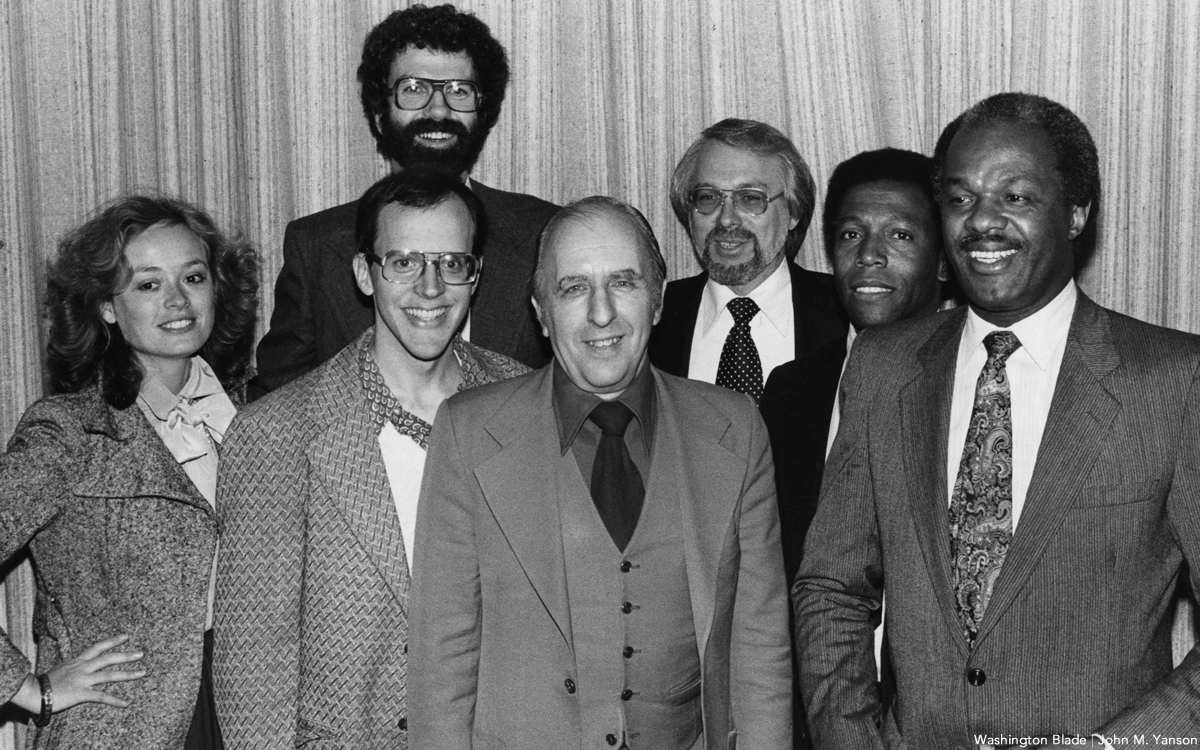
In 1983, Easley moved to New York City to live with Freiberg after the two became a couple that year. A short time later, Easley, while continuing his activism, enrolled in Yale University’s graduate school where he received a master’s degree in public health in 1986. Freiberg said Easley then taught public health law at Yale’s medical school part time for the next two years. During his time as a student and as a teacher at Yale, Easley commuted from Manhattan to New Haven four days a week, Freiberg said.
Easley, an only child, was born in Robstown, Texas, near Corpus Christi and spent his early childhood years in Truby, Texas, a small farming town where he started school in a one-room schoolhouse. His family moved to Eagle Pass, a Texas border city on the Rio Grande River in 1950, Freiberg said, where Easley graduated from Eagle Pass High School.
He received his undergraduate degree with a major in English from Texas A&M University in 1963. Freiberg said when Easley was about to be drafted during the Vietnam War in 1966, he enlisted in the U.S. Navy and served on a Naval intelligence base on a small island near the Alaska-Russian border.
“After a year, he was told that a friend who had propositioned him for sex before he ever joined the Navy informed the government that he was gay,” Freiberg said in recounting Easley’s brief period of military service. “His commander apologetically told him that he had no choice but to kick him out—all gay people were barred from serving—but that because of his exemplary service he would ensure Joe Tom received an honorable discharge and veteran benefits.”
His Navy benefits through the longstanding G.I. Bill veterans’ education program helped to pay Easley’s tuition at the University of Texas School of Law in Austin, where he received his law degree.
During and shortly after his law school years Easley became involved with the anti-Vietnam War movement and during summer breaks as a law student became involved with the first group of Ralph Nader’s, “Nader’s Raiders” drawing attention to government and corporate malfeasance, according to Freiberg.
After law school Easley served as a law clerk for a federal judge in Boston from 1971 to 1972 before serving as an assistant professor for the next two years at the University of Georgia Law School in Athens, Freiberg said.
Easley next left for Europe in 1975, where he worked for the Brussels-based European Bureau of Consumer Organizations. Among other things, he assisted with an investigation of price-fixing by pharmaceutical companies.
Freiberg recalled that over the course of his career Easley also taught part-time for short periods at the University of Virginia Law School and New York’s Cardozo Law School.
He said Easley’s devotion to LGBTQ equality and civil rights for other minorities, including African Americans, began in full force when he returned to the U.S. from Europe to begin teaching at American University in D.C.
In addition to his affiliation with local D.C. LGBTQ groups, over the next 30 years Easley became involved with and helped advance the work of a number of national LGBTQ organizations. Among them was Lambda Legal, the New York-based LGBTQ litigation group for which Easley served on the board of directors from 1981 to 1991 and as board co-chair from 1983 to 1987.
From 1988 to 1995 he served as president of the Human Rights Campaign Fund Foundation, which later changed its name to the Human Rights Campaign Foundation. He also served on the board of the Servicemembers Legal Defense Network (SLDN), a national group that assisted LGBTQ service members facing discharge from the military due to their sexual orientation or gender identity.
Freiberg said Easley’s own discharge from the Navy for being gay helped to solidify his commitment and dedication to the cause of LGBTQ service members.
With Easley’s active involvement, SLDN played an important role in the successful campaign to persuade Congress to repeal the “Don’t Ask, Don’t Tell” law, which continued to be used to discharge LGBTQ people from the military if their sexual orientation or gender identity became known to military authorities.
Freiberg said Easley’s skills as a public speaker on behalf of LGBTQ equality surfaced in 1988 when he delivered the closing speech before more than 200 LGBTQ leaders from across the country attending a “War Conference” in Warrenton, Va., called by AIDS activist Larry Kramer to draw attention to the continuing AIDS epidemic, anti-LGBTQ court decisions, and anti-gay vitriol by religious right groups.
In what he and Easley also considered a gesture in support of LGBTQ equality, Freiberg said he and Easley in 2003 traveled to Toronto to legally marry. Their wedding became what the couple believed to be the first same-sex wedding to be written about in the New York Times’s wedding celebration feature.
“We felt strongly that legal marriage would not make one bit of difference in our relationship, and it didn’t,” said Freiberg. “But we wanted to make a political statement that our love and devotion was equal to anyone else’s, and that gay couples deserved equality before the law, including benefits and responsibilities,” Freiberg said.
“His whole life was animated by a desire to work for social justice and to do good,” said Freiberg. “He supported the underdog, whether LGBT people, African Americans, an injured Iraqi boy or the disabled, which he was in his last three years.”
Freiberg was referring to the national news media attention Easley received in 2005, including a story in the New York Times, after he arranged for an Iraqi boy injured in Iraq by a U.S. bomb to be brought to the U.S. for medical treatment.
“Joe Tom Easley was a dear friend and mentor who taught me much about leadership, LGBT politics, the law and about giving,” said Vic Basile, former executive director of the Human Rights Campaign and a longtime LGBTQ rights advocate. “He led by example, giving generously of his time and broad knowledge to help others in need, never asking or expecting anything in return,” Basile said.
Easley was predeceased by his parents, Tom Lee Easley and Lady Hampton Easley.
He is survived by his husband and partner of 39 years, longtime journalist Peter Freiberg; his sister-in-law and brother-in-law Eileen and Barney Freiberg-Dale; his niece, Sabrina Freiberg-Dale; his nephew, Hunter Dale and fiancée Eve Lichacz; a cousin, Jane Hays; and many friends around the world.
Plans for a memorial service, including a memorial event in D.C., will be announced. Contributions in his memory can be made to Lambda Legal, the U.S. Holocaust Memorial Museum, and the National Parks Foundation.
Obituary
Beloved schoolteacher, D.C. resident Patrick Shaw dies at 60
Colleagues, friends say he ‘touched so many lives’ with warmth, kindness
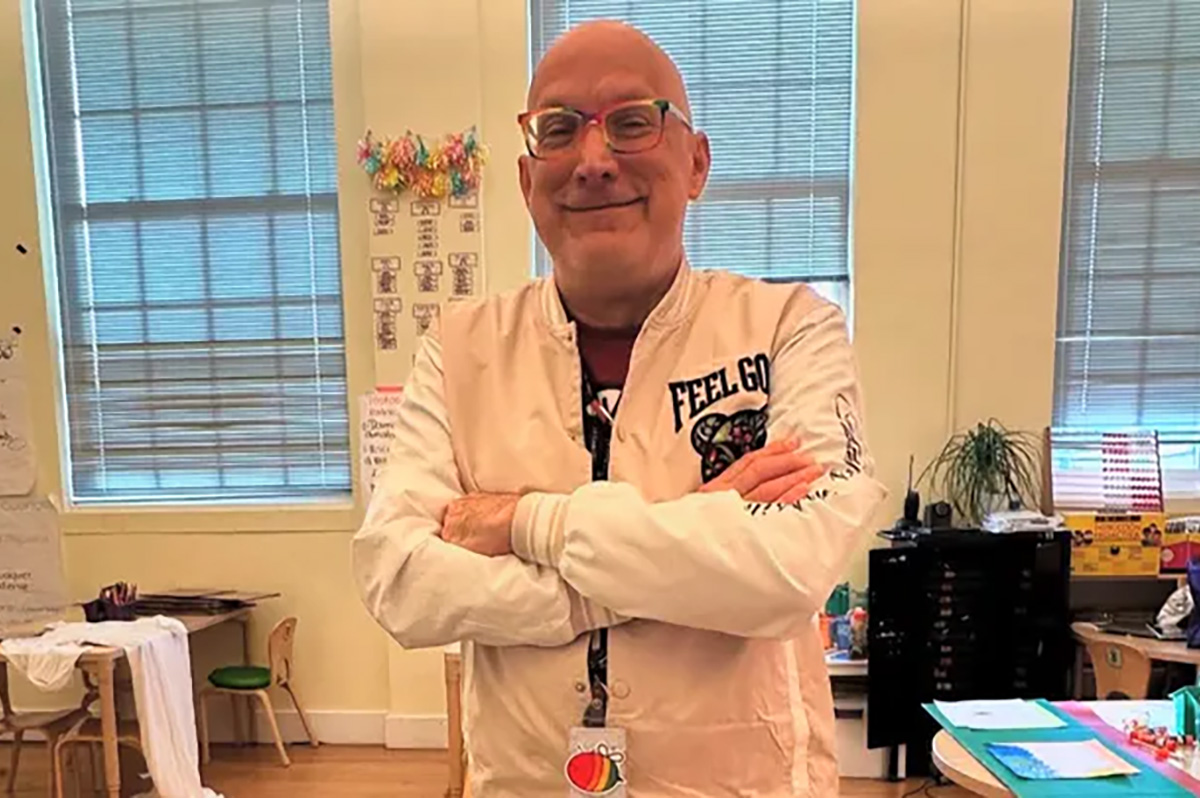
Patrick Dewayne Shaw, a highly acclaimed elementary school teacher who taught and served as vice principal in several D.C. schools since moving to the District in 2002, died April 19 at the age of 60.
His friend Dusty Martinez said his passing was unexpected and caused by a heart related ailment.
“Patrick touched so many lives with his warmth, humor, kindness, and unmistakable spark,” Martinez said in a statement. “He was a truly special soul – funny, vibrant, sassy, and full of life, and we are heartbroken by his loss,” Martinez wrote.
Among those reflecting on Shaw’s skills as an educator were his colleagues at D.C.’s Mundo Verde Bilingual Public Charter School, where he served as a second-grade special education teacher since August 2023.
“Patrick brought warmth, joy, and deep commitment to Mundo Verde,” his colleagues said in an Instagram posting. “His daily Broadway sing-alongs, vibrant outfits, and genuine love for his students filled our community with energy and laughter,” the posting says.
Biographical information provided by Martinez and Karen Rivera Geating, a senior inclusion manager at the Mundo Verde school and Shaw’s supervisor, shows Shaw had a distinguished 38-year teaching career and multiple degrees in the field of education.
He was born and raised in Little Rock, Ark., and graduated from Little Rock’s Catholic High School for Boys.
He received two bachelor’s degrees, one in philosophy from St. Meinrad Seminary College in Indiana and one in elementary education from the University of Minnesota in St. Paul.
The biographical information shows Shaw received three master’s degrees. One is in secondary education and history from the University of Arkansas at Little Rock. His second master’s degree is in special education from The Catholic University of Washington, D.C. His third master’s degree is in school administration from Trinity College in D.C.
Shaw began his teaching career in 1987 in Little Rock, Ark., as a fourth grade General Education Teacher at Our Lady of Good Counsel School and a short time later at Little Rock’s St. Theresa Catholic School as a fourth-eighth grade teacher through December 1989.
He next moved to Minnesota where he spent part of the 1990s as a fifth and sixth grade teacher and a physical education instructor, according to biographical information. His resume shows that from January 1995 to December 1998 he was associated with the Minnesota AIDS Project in Minneapolis.
He “recruited, interviewed and staffed volunteer education and transportation programs for people living with HIV and AIDS,” his resume states.
Shaw next returned to Little Rock where he served from January 1998 to December 2004 as Theology Department Chair at the Mt. St. Mary Academy. His work included creating theology lessons for ninth-12th graders and creating a social justice program for 12th graders.
Upon moving to D.C., Shaw served as classroom teacher and vice principal at several schools, including the D.C. Public School’s Benning Elementary School; vice principal at Chavez Prep Public Charter School; vice principal at Bridges Public Charter School; Special Education Coordinator at Monument Academy Public Charter School; and Special Education Case Management and Math Intervention Specialist at D.C.’s College Preparatory Academy for Boys.
“Patrick dedicated 38 wonderful years to teaching, from 1987 to 2025, inspiring generations of students with his passion, wit, and kindness,” Martinez said in his statement.
Shaw was predeceased by his mother, Myrna G. Shaw, and is survived by his father, Thomas H. Shaw, his brother, James Shaw (Michele), his sister, Angela Mahairi (Wafai), and his cherished niece and nephews Austin, Tariq, Reed, Ramy, and Jasmine, according to information provided by Martinez.
Martinez said a funeral mass would soon be held in Little Rock, Shaw’s hometown.
“His family will be honoring one of his last wishes,” Martinez wrote, “to be returned home and remembered in a unique and meaningful way” – by having a tree planted in his honor, “a living tribute to the full and beautiful life he lived.”
Details of the location of the planted tree will be shared soon to offer a place where “friends and family can visit, reflect, and stay connected with his spirit,” Martinez states.
In D.C. a celebration of life for Shaw is scheduled to be held Saturday, May 3, from 2-5 p.m. at JR.’s bar at 1519 17th Street, N.W. Martinez points out that the tribute will be held during JR.’s weekly Saturday “Showtunes” event, in which sing-along performances of famous Broadway musicals are shown on video screens.
“JR.’s Saturday Showtunes were one of Patrick’s absolute favorite traditions, and gathering in that spirit feels like the perfect way to honor him,” Martinez said.
“Many have asked how they can help,” Martinez concludes in his statement. “In response we’ve created a GoFundMe page to support funeral expenses, help find a loving home for Patrick’s beloved dog, Birdie, and assist with other needs during this difficult time.”
Any remaining funds, according to Martinez, will be donated to a charity “that reflects Patrick’s passions and values.”
The GoFundMe page can be accessed at: gofundme.com/f/honoring-patrick-shaws-vibrant-legacy.
Obituary
Local attorney, LGBTQ rights advocate Dale Sanders dies at 75
Acclaimed lawyer credited with advancing legal rights for people with HIV/AIDS
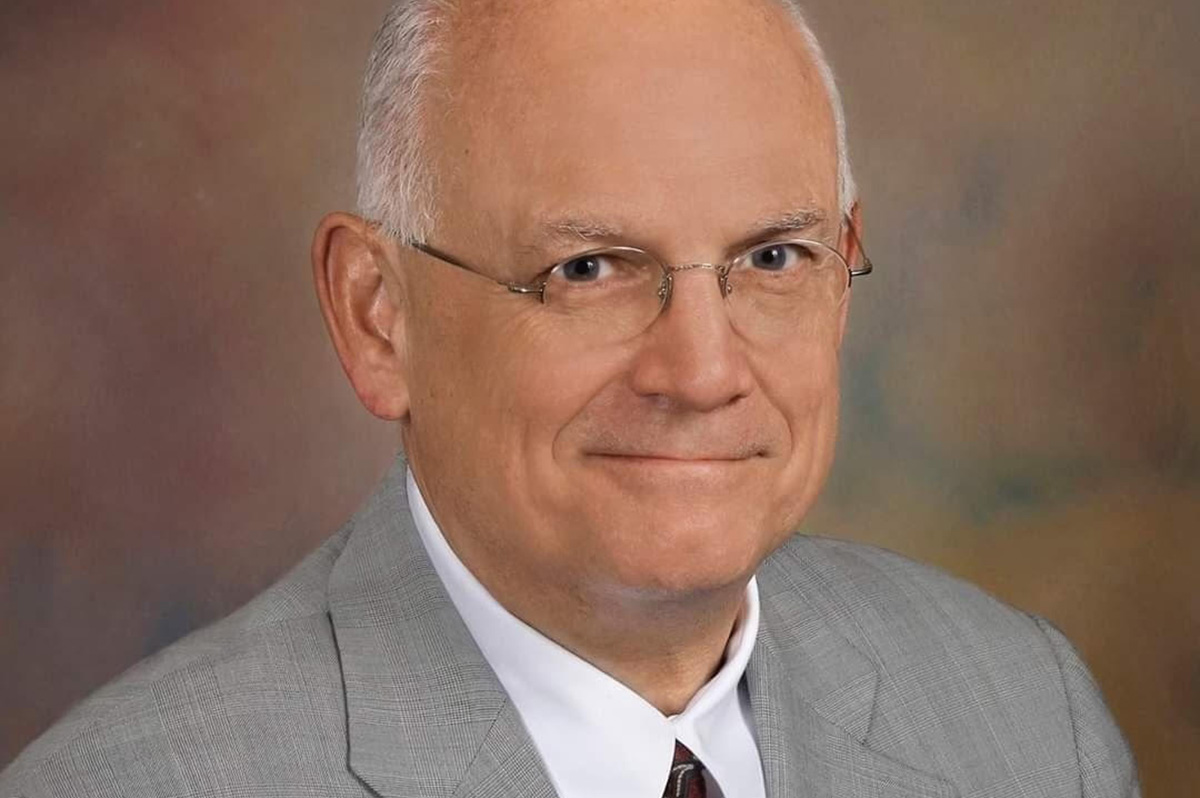
Dale Edwin Sanders, an attorney who practiced law in D.C. and Northern Virginia for more than 40 years and is credited with playing a key role in providing legal services for people living with HIV/AIDS beginning in the early 1980s, died April 10 at the age of 75.
His brother, Wade Sanders, said the cause of death was a heart attack that occurred at Johns Hopkins Hospital in Baltimore shortly after he had back surgery.
Wade Sanders described his brother as a “trial lawyer, passionate criminal defense, and civil litigator for human rights” for close to 50 years, with some of his work focused on “civil law, notably gay-related insurance discrimination during the AIDS epidemic.”
He called his brother “a zealous advocate for the oppressed, his clients, and his personal convictions.”
Born in Arlington, Va., and raised in McLean, Va., Dale Sanders graduated from Langley High School in McLean and received his bachelor’s degree from the University of Virginia, his brother said. He received his law degree from D.C.’s American University Washington College of Law and began his law practice in 1976 in Old Town, Alexandria, Wade Sanders said.
Amy Nelson, director of Legal Services for D.C. ‘s Whitman-Walker Health, said Sanders became one of Whitman-Walker’s original volunteer pro-bono attorneys in the 1980s.
“Dale was a beloved part of the legal services program and our medical-legal partnership for nearly 40 years,” Nelson said. “Dale was one of the clinic’s first volunteer attorneys at Whitman-Walker’s weekly, legal walk-in clinic offering free counseling to clients about their legal rights in the face of HIV/AIDS and LGBT discrimination from employers, landlords, medical providers, and insurance companies,” according to Nelson.
Nelson added, “Dale represented dozens of people impacted by the ignorance and prejudice attendant to an HIV/AIDS diagnosis, and his litigation wins were instrumental in advancing the legal rights of persons living with HIV/AIDS.”
Sanders’s most recent case on behalf of Whitman-Walker took place in 2023 in support of a transgender woman in Virginia who faced discrimination from her employer and health insurer, Nelson said.
In 1989, Whitman-Walker presented Sanders with its Gene Frey Award for Volunteer Service, and in 1994 presented him with its Founders Award for Pro Bono Legal Services, Nelson told the Blade. She said in 2024, Whitman-Walker re-named its annual Going the Extra Mile Pro Bono Award as the Dale Sanders Award for Pro Bono Excellence.
“Dale’s legacy helped to shape HIV/AIDS law, and his fierce commitment to justice will live on at Whitman-Walker Health,” Nelson said in a statement. “We will miss him dearly.”
Daniel Bruner, who served as Whitman-Walker’s legal services director prior to Amy Nelson taking that position, said Sanders played a role in shaping his own legal skills and knowledge.
“Dale was one of my earliest legal models among local, and national, advocates for people living with HIV and LGBT people,” Bruner told the Blade. “He was a fierce, persistent advocate for his clients and for the community,” Bruner said, adding, “He won key victories in several cases where employees’ or health care patients’ privacy had been egregiously violated. I certainly will never forget him.”
Wade Sanders said his brother was also an avid bridge player, saying he played competitively. “He earned the rank of Ruby Life Master, a pretty big deal in the bridge world,” Wade Sanders said.
Dale Sanders is survived by his husband, Christian Samonte; his sister, Joyce Sanders of York, S.C.; his brother Wade Sanders of West Jefferson, N.C.; and his beloved dogs Langley and Abigail, his brother said in a statement.
A memorial service for Dale Sanders organized by the Sanders family and the LGBTQ Catholic group Dignity Washington will be held Saturday, May 10, at 1 p.m. at St. Margaret’s Episcopal Church at 1830 Connecticut Ave., N.W. in D.C., a Dignity Washington spokesperson said.
Obituary
Nanette Kazaoka, an unlikely AIDS activist, dies at 83
Member of ACT-UP, longtime social justice advocate
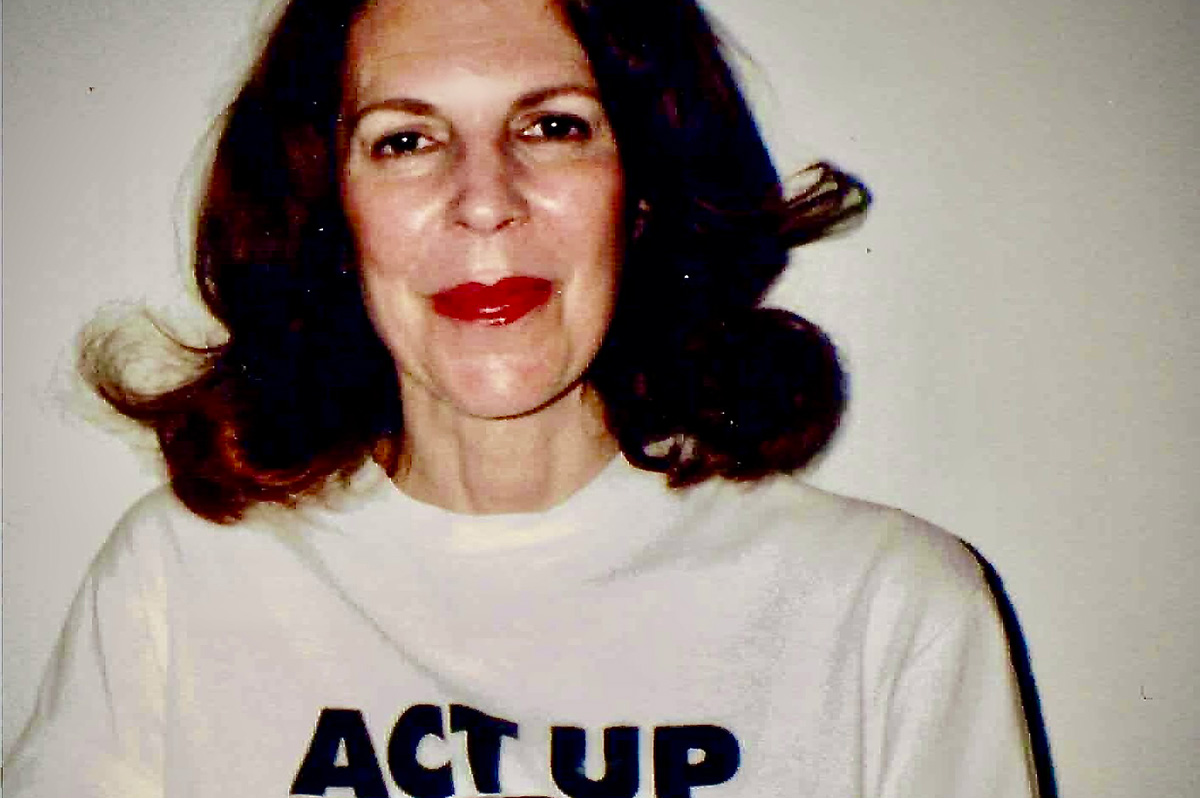
Nanette Kazaoka, a well-known figure in the fight for HIV/AIDS awareness and the rights of marginalized communities, passed away on Oct. 2 at her home in New York City. She was 83. The cause of death was complications from vascular dementia and Alzheimer’s disease, according to a statement from her daughter Kelly Kochendorfer.
Kazaoka was an advocate for justice, particularly in the early days of the AIDS crisis, when she became a member of the AIDS Coalition to Unleash Power, or ACT-Up. She is perhaps best remembered for her participation in a 2004 protest in front of Madison Square Garden during the Republican National Convention, when she and 11 fellow activists staged a dramatic naked demonstration, demanding debt cancellation for impoverished countries, according to a statement from the family.
“Bush, Stop AIDS. Drop the Debt Now!” they chanted, with slogans stenciled in black paint on their bodies. The bold protest drew national attention and underscored the urgency of global debt relief as a key element in the fight against AIDS.
She was born Nanette Natalina Bottinelli on June 12, 1941, in New York City. Her father, Angelo, worked as a waiter at the St. Regis Hotel, while her mother, Betty McComb, was a part-time burlesque dancer.
She married her first husband, Fred Kochendorfer, in 1963, and they had two children together, Kim Skrobe and Kelly, both of whom survive her.
Kazaoka’s journey to Fire Island marked a transformative period in her life. Kochendorfer wanted to live there, and so they began renting in 1967. Kazaoka then made a bold decision that would shape her future: She left her husband for another man and began living on Fire Island in 1968-1969, with the children attending school in Ocean Beach, according to the family’s statement.
This period coincided with the early days of the gay rights movement, as Fire Island was emerging as a hub for LGBTQ culture. Her experiences during these years contributed to the strong sense of activism and solidarity that would later define her role in ACT-UP and the broader fight for LGBTQ rights.
Kazaoka’s second husband, Katsushiga “Kats” Kazaoka, a Japanese-American psychologist who had been interred during World War II, died of cancer in 1984, pushing her to enter the workforce as a receptionist while studying occupational therapy at Downstate Medical Center. By 1990, she had earned her degree and sought work with AIDS patients.
In 1988, a close friend introduced her to ACT-UP, sparking the start of her full-time dedication to AIDS activism, the family said. Kazaoka became known for her passionate, unrelenting activism, whether protesting at City Hall or challenging anti-LGBTQ policies at St. Luke’s Hospital.
Kazaoka’s activism spanned 35 years, making her a beloved and respected figure within ACT-UP and beyond, the family noted. She was featured in Sarah Schulman’s “Let the Record Show: A Political History of ACT-Up New York, 1987-1993” as well as “Act-Up Oral History, No. 162,” a digital history. She was the cover photo of “Fag Hags, Divas and Moms: The Legacy of Straight Women in the AIDS Community,” and was included in The New York Times T Living Magazine story, “LEGENDS PIONEERS AND SURVIVORS.
Her dedication to science continued even after her passing: She donated her brain to the Mount Sinai NIH Brain and Tissue Repository for research to advance the understanding of the human brain health and disease to help end dementia, the family said.
Along with her daughters, Kazaoka is survived by her son-in-law John Skrobe, granddaughter Stella Skrobe and daughter-in-law Christine Arax, all of New York. She and her third husband, Paul Haskell, divorced in 2000.
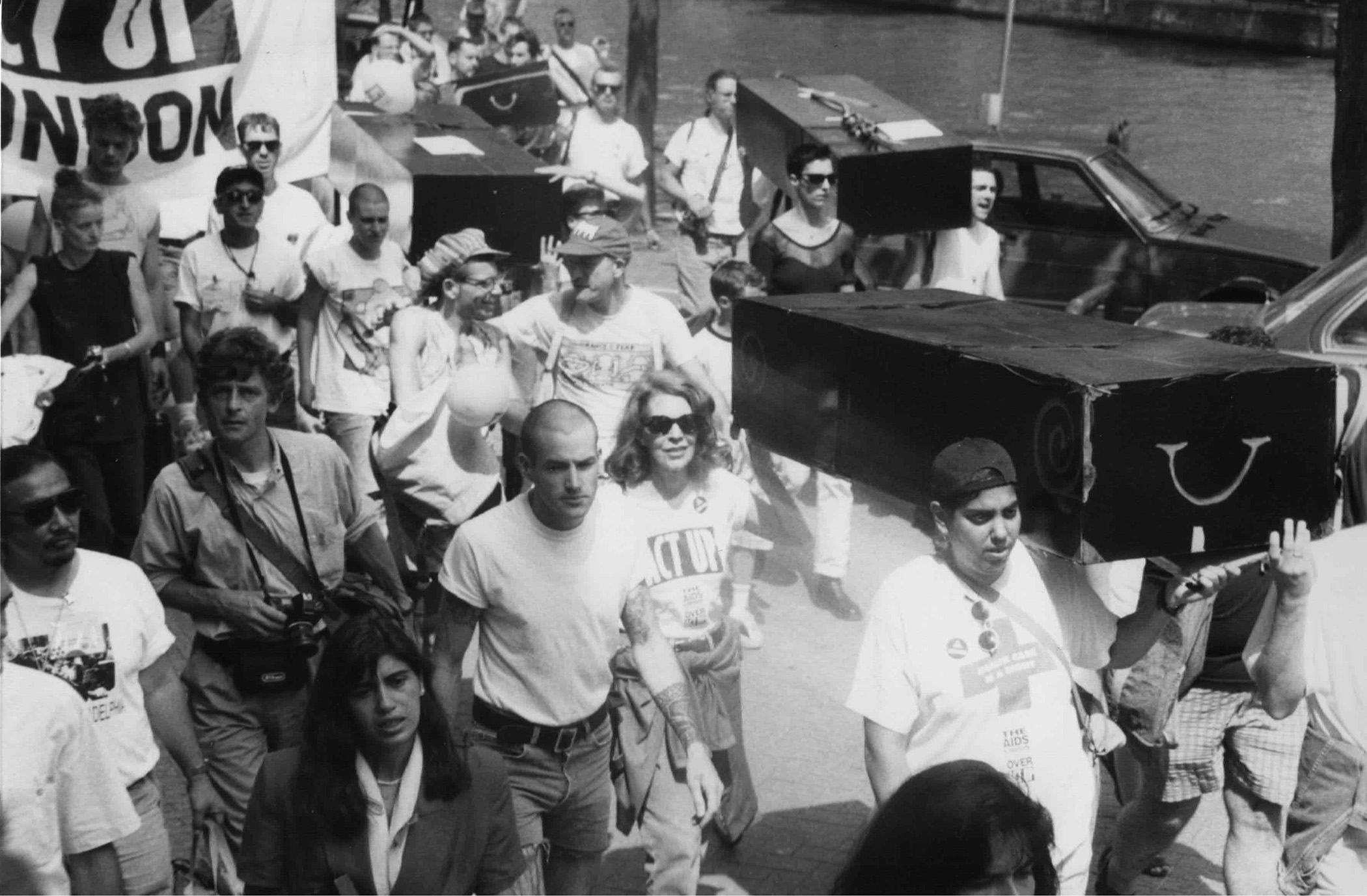
-

 U.S. Supreme Court4 days ago
U.S. Supreme Court4 days agoSupreme Court upholds ACA rule that makes PrEP, other preventative care free
-

 U.S. Supreme Court4 days ago
U.S. Supreme Court4 days agoSupreme Court rules parents must have option to opt children out of LGBTQ-specific lessons
-

 District of Columbia5 days ago
District of Columbia5 days agoMan sentenced to 15 years in prison for drug deal that killed two DC gay men
-

 Federal Government5 days ago
Federal Government5 days agoWhite House finds Calif. violated Title IX by allowing trans athletes in school sports



